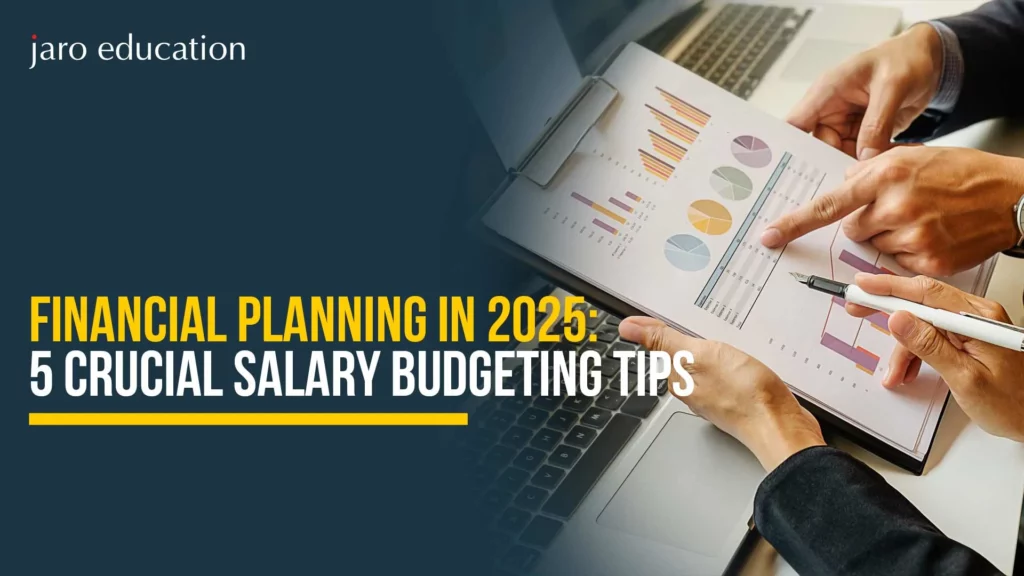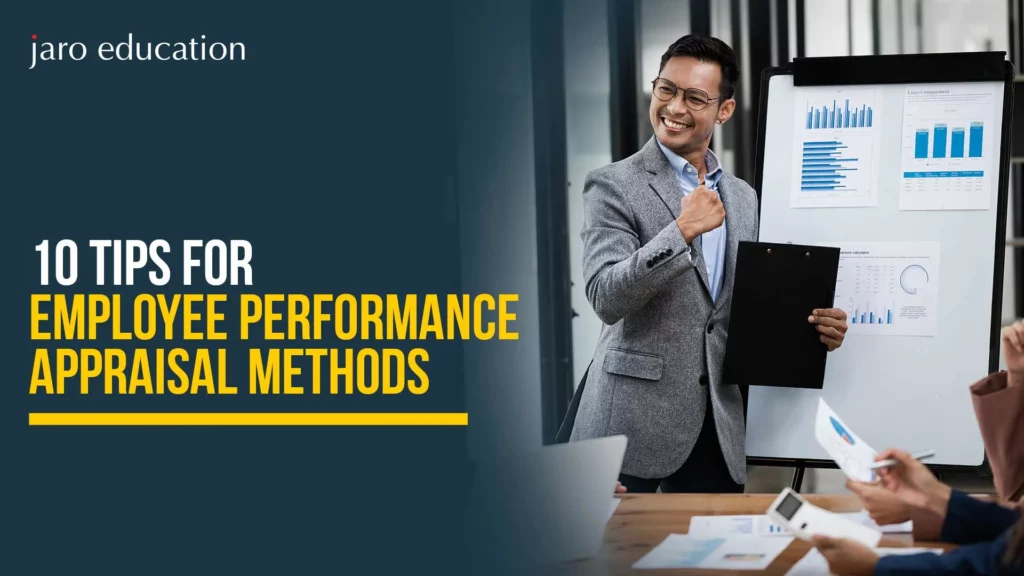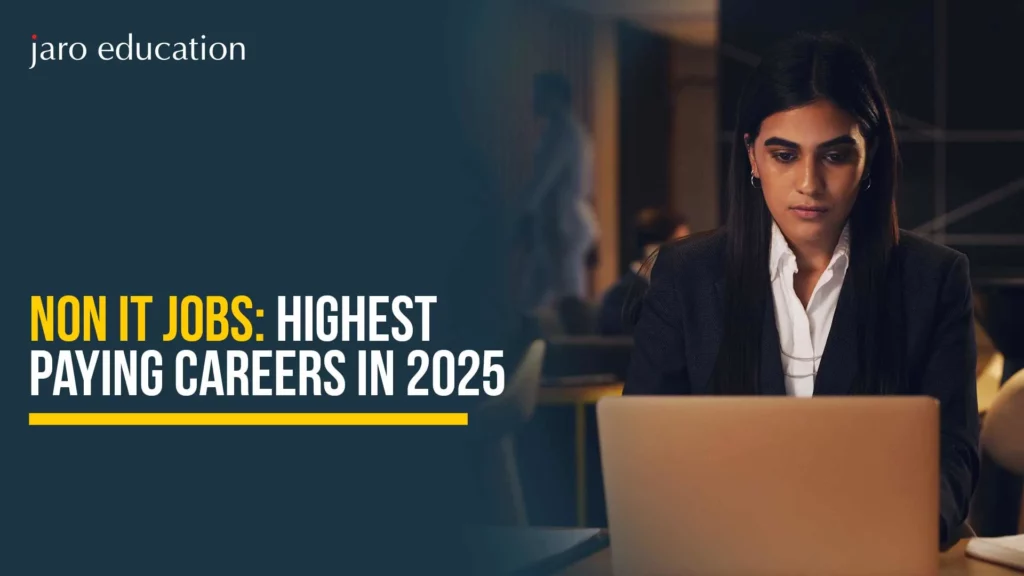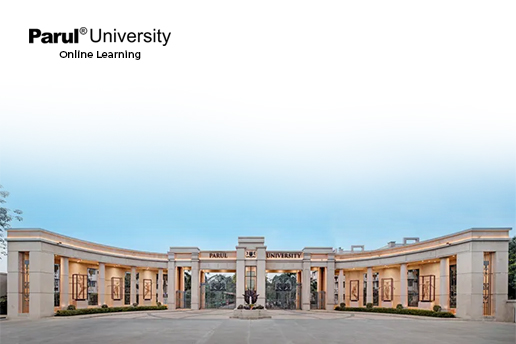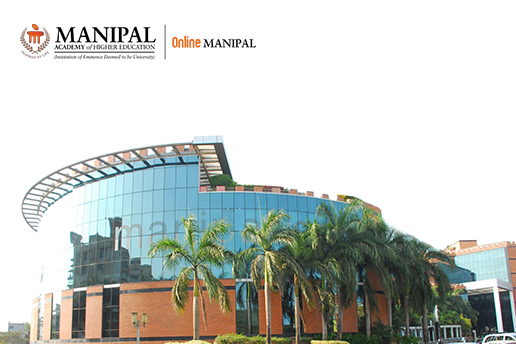The Ultimate Guide: Is an Executive MBA Worth It?
Table of Contents

In a globalized world where innovation fuels competition and leadership is success, professionals never stop looking for the next way to lead. Whether you’re looking at a promotion, planning a career pivot that’s strategic, or focusing on driving digital transformation in your company, building business acumen is often the next step. This is where an Executive MBA comes into the mix—not as another credential, but as a potentially life-altering experience.
But the choice isn’t always clear-cut. With increasing executive mba prices and an array of program forms on offer—from web-based to hybrid—it’s important to set the tangible advantages against the money and time investment. Does the course bring value in the fast-changing business environment of today? Does it bridge the skills gap and get individuals leadership-ready? And above all: Is executive MBA worth it for someone like you?
Why Professionals Are Considering an Executive MBA More Than Ever
Are you in career limbo—looking to level up, hankering to move into a leadership role, or contemplating a career leap into a high-growth industry? As professionals today confront an ever more dynamic labor market, the allure of an Executive MBA is stronger than ever. But first, before you spend time, effort, and capital, the question lingers: Is an executive MBA worth it?
With rising executive mba prices and a saturated marketplace of programs—full-time and online as well as hybrid options—it’s natural to question if the investment yields the return you require: enhanced leadership skills, business networking, and career advancement.
This guide goes beyond solving fundamental concerns—career effect, ROI, program comparisons, and how to get clarity on your next step. Let’s explore — Is an executive MBA worth it for you right now?
1. Understanding the Executive MBA
- Who it’s for: Mid- to senior-level managers with 8+ years of work experience
- Focus areas: Strategic leadership, cross-functional acumen, global business perspective
- Key differences vs. traditional MBA:
- Designed for working professionals
- Flexibility in attendance (online, hybrid, weekends)
- Peer learning from experienced cohort
- Designed for working professionals
To put it simply, the Executive MBA vs. MBA difference is about experience, delivery, and career level. MBAs are appropriate for early- to mid-career prospects, while Executive programs are for mature professionals to transition into the C-suite
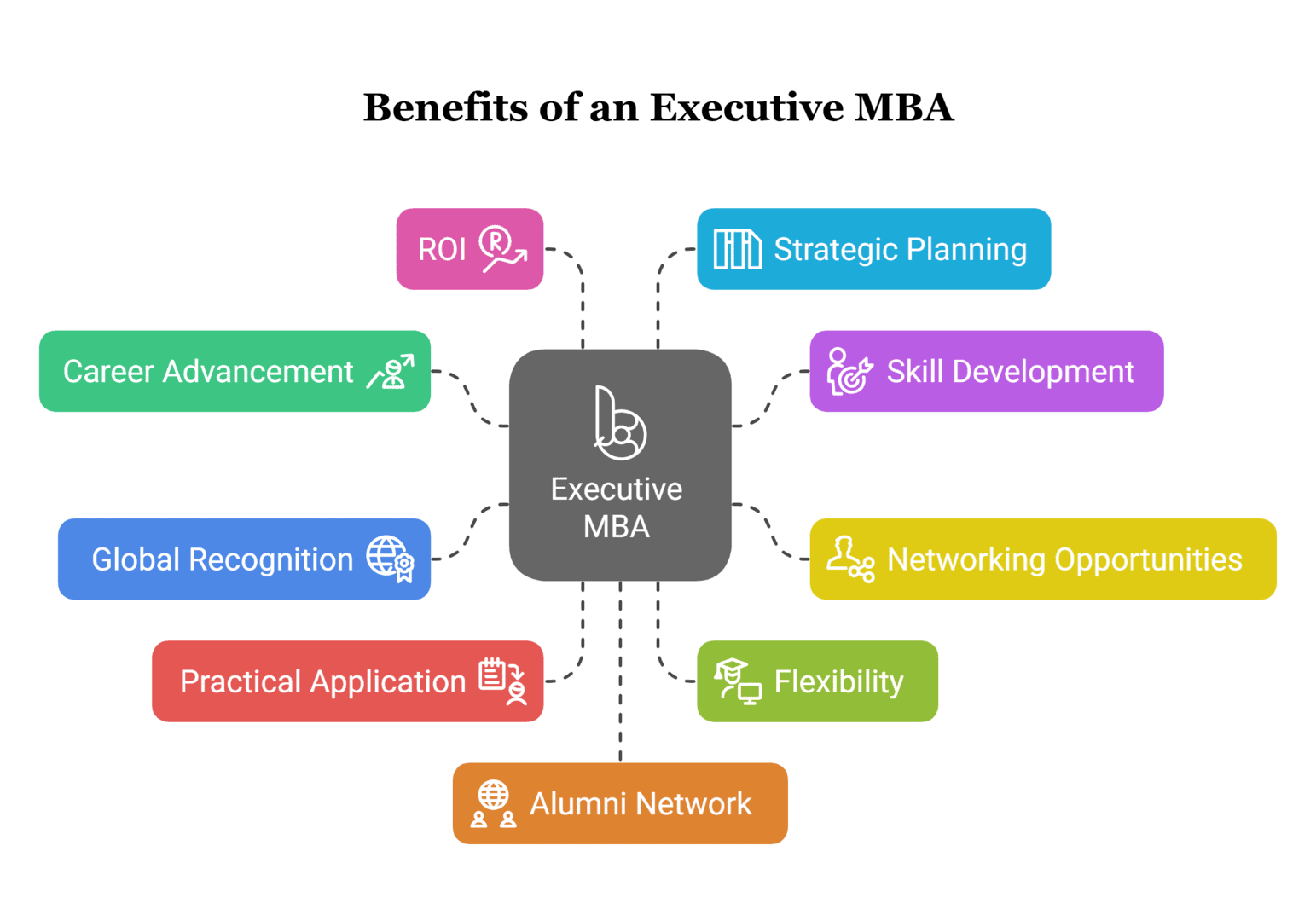
2. Is Executive MBA Worth It?
To answer, is executive mba worth it, let’s break down what matters: cost, career fuel, skills gap, and program design.
Executive MBA Fees vs. Value
Executive mba fees up front differ from program to program—from ₹2 Lakh online to ₹20 Lakh for the best executive MBA programs at IIM-Mumbai. Here’s the breakdown:
| Program | Provider | Fee (₹ Lakhs) | Format | Ideal for |
|---|---|---|---|---|
| Online MBA | Manipal University | 4.5 | 24 months, 100% online | Early senior roles seeking digital leadership |
| Online MBA | Chandigarh University | 3.8 | 2 years, online | Mid-career looking for agile management skills |
| Online MBA | DPU College | 3.2 | 2 years, blended | Professionals wanting affordable online credentials |
| Executive MBA | IIM Nagpur | 8–10 | 18 months, blended | Senior managers aiming for higher leadership |
| Executive MBA | IIM Mumbai | 15–20 | 15 months, modular | Executives targeting C-suite acceleration |
| Executive MBA | DSU | 6–8 | 18 months, hybrid | Regional leadership track |
| Online MBA | SSODL (Symbiosis) | 5 | 2 years, live online | Mid-career with interest in brand management |
| Online MBA | MAHE | 4 | 2 years, online | Tech professionals evolving into Mx roles |
| Online MBA | Parul University | 3 | 2 years, online | Cost-conscious professionals beginning leadership journey |
Pros vs. fees: Data from industry reports shows online Executive MBA graduates report ~30–40% career acceleration post-completion. Let’s analyze in detail.
Sourced from LinkedIn Workforce Report & NASSCOM (2024–25)
Career Impact & Advancement
Promotions & New Roles
- 68% of Executive MBA alumni report promotion within 2 years post-degree.
- Leadership roles in strategy, general management, or operations increase substantially.
Salary Uplift
- Median increase in salary is ~25% after 12 months, according to LinkedIn data. Graduate networks, VIP access to opportunities, and projects highlighted in executive assignments lead to increases.
- Note: salary uplift correlates with experience, industry, and program reputation.
Skill Gap Closure
Top skill gaps filled by EMBA grads:
- Strategic thinking & decision-making
- Cross-functional leadership
- Digital transformation management
- Global business acumen
No wonder the best executive mba programs emphasize executive coaching, capstones, and international modules—all proven to bridge such gaps.
Based on alumni impact studies across top Indian EMBA programs
Market Demand & ROI
High-Demand Industries
| Sector | Demand for EMBA Grads | Salary Range (₹ LPA) |
|---|---|---|
| IT & Digital | Strong, especially in Product & Strategy | ₹25–35 |
| Healthcare & Pharma | Uptick in leadership & operations | ₹20–30 |
| Financial Services | Management & transformation roles | ₹30–40 |
| Manufacturing | Senior roles in strategy & supply chain | ₹18–28 |
| Consulting & Start-ups | Strategy, expansion, pivot management | ₹20–40 |
Global immersion or project capstone programs improve ROI by 15–20%.
MBA impact surveys trends, NASSCOM 2024 report
Pros & Cons Snapshot
Pros
- Leadership & strategic thinking development
- Strong peer networks across industries
- Application of learning at work immediately
- Credible qualification from top institutes
Cons
- Tremendous time investment (15–24 months)
- Executive MBAs cost more than traditional MBAs
- Online formats need high self-discipline
- No guaranteed placements—ROI highly dependent on individual motivation
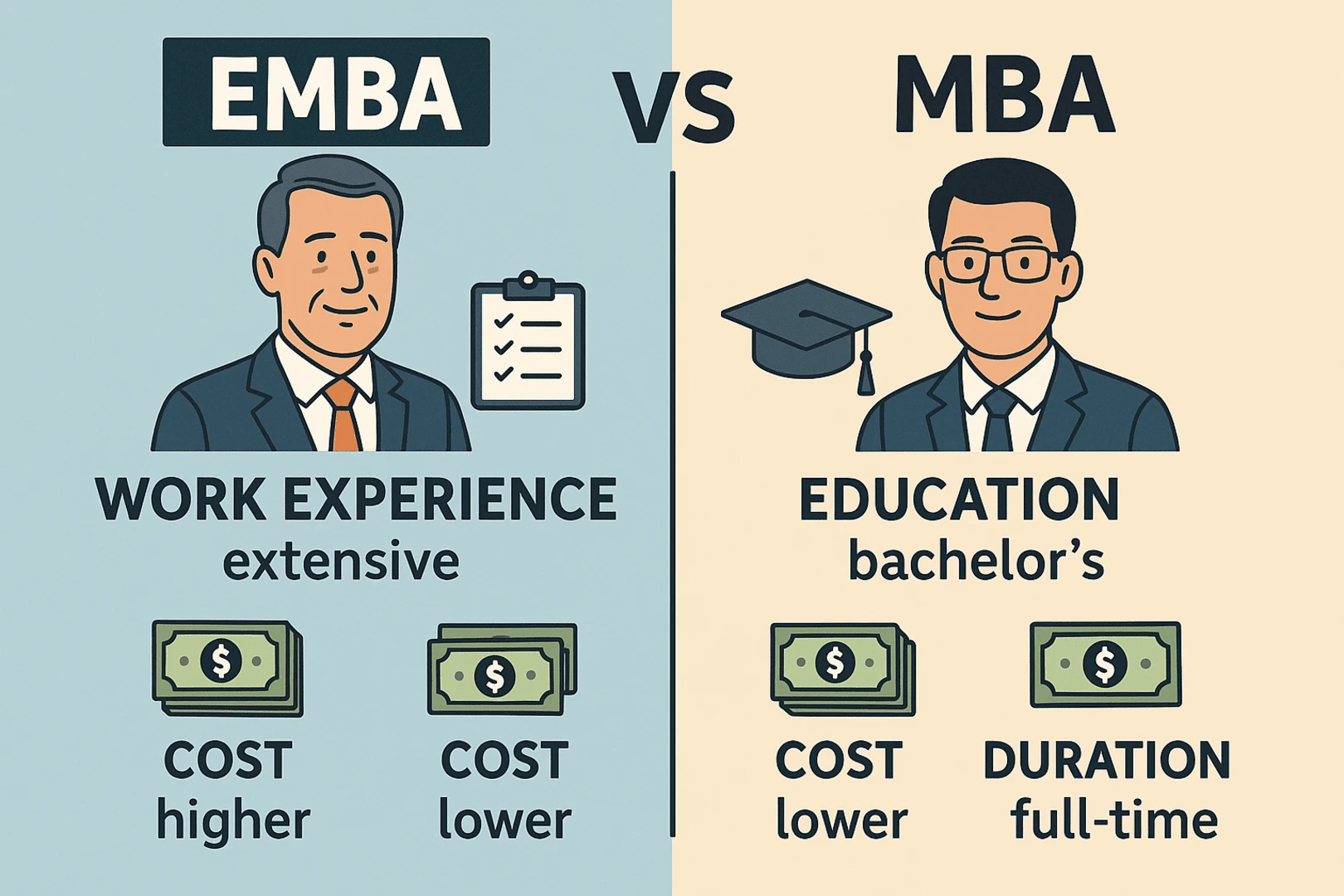
3. Choosing Between: Executive MBA vs MBA
When EMBA Makes Sense
- If you have ≥ 8 years of experience already in leadership or senior management
- Immediate workplace application is crucial
- If you’re aiming for executive leadership or cross-functional authority
- Budget and time align with program duration and delivery style
When Traditional MBA Might Be Better
- If you’re in early- to mid-career (2–7 years experience)
- Pursuing career shift into new industries where a pre-MBA internship is a major factor
- Willing to take a break from work or go full-time
Selecting the Right Program
To pick the best executive mba programs, evaluate:
- Program fit—matched to experience and objectives
- Delivery mode—online, hybrid, global residencies
- Brand & alumni network—particularly for strategic sectors
- Structured support—mentors, career services, community
4. Executive MBA Requirements
Here’s what you typically need to qualify:
- Experience: 8–12 years, including managerial responsibility
- Education: Bachelor’s degree in any discipline
- Assessment: Frequently involves interviews and personal statements
- Fees: Knowledge of executive mba fees, such as scholarships or installments
- Availability: Provision of flexibility for residencies, live sessions, or weekends
Each program sets certain benchmarks, but most correspond broadly with these parameters.
How Jaro Helps
As India’s go-to upskilling platform, Jaro Education aids professionals considering, Is executive MBA worth it? and gives them concrete steps to go forward.
Jaro & University Partnerships
Jaro offers Executive MBA programs in collaboration with:
- IIM Nagpur (Blended EMBA for Working Professionals)
- IIM Mumbai (Executive MBA)
- DSU Executive MBA
Each program combines academic excellence with flexible delivery designed for busy professionals.
Key Benefits
- Flexible Learning: Hybrid format—weekend residencies, online sessions—ideal for active managers
- Expert Faculty: Learn from IIM/DSU mentors and industry leaders
- Peer Cohort: Network with professionals across sectors
- Capstone & Projects: Implement live-business projects every term
- Career Support: Personalized guidance, CV & interview prep, Jaro Connect alumni community
Quick Program Highlights
| Course | Duration | Format | Key Skills | Ideal Learner |
|---|---|---|---|---|
| Executive MBA (IIM Mumbai) | 15 months | Modular blended | Strategy, Leadership, Finance, Digital Mgmt | Senior execs targeting C-Suite |
| Blended MBA (IIM Nagpur) | 18 months | Hybrid | Leadership, Analytics, Global Strategy | Mid-senior managers, GTM roles |
| Executive MBA (DSU) | 18 months | Hybrid-online | Strategy, Operations, Change Mgmt | Regional execs & industry heads |
- Note: Jaro provides admission counseling, but degrees are awarded by partner institutes—not Jaro.
- For certification programs (e.g., IIT/IIM tie-ups), Jaro is the service partner—facilitating admissions and learner support, not the credential issuer.
The Jaro Advantage
- Personalized Counseling
- One-on-one discussion to assess your profile, goals, and level
- Shortlist relevant EMBA vs MBA options
- One-on-one discussion to assess your profile, goals, and level
- Curated Courses by Insights
- Exclusive partnerships informed by market trends and employer needs
- Programs designed for today’s executive challenges
- Exclusive partnerships informed by market trends and employer needs
- Jaro Connect
- Access to alumni & mentor networks
- Career support, including virtual workshops and hiring fairs
- Access to alumni & mentor networks
Ready to elevate your career?
- Start your learning journey today.
- Get personalized guidance from our experts.
- Explore exclusive Executive MBA programs with India’s top institutes.
Making the Right Move for Your Career
In a more complicated business landscape, combining executive training with strategic leadership credentials is critical. Asking “is an executive MBA worth it?” is not simply a matter of fees—it’s about whether it opens doors to leadership positions, increases your impact, and drives career advancement.
By carefully evaluating your experience, objectives, and program fit, you can get the best return on investment from executive MBA fees. And through Jaro Education—your trusted mentor, guide, and platform—you get access to customized programs, expert guidance, and a community that fosters your growth.
Regardless of whether your goal is to ascend to the C-suite, shift industries, or drive digital change, Jaro is by your side every step of the way. Take the next step: map your future and let an Executive MBA be your accelerator.
Frequently Asked Questions
What kind of support does Jaro provide during the EMBA program?
Jaro offers personalized career counseling, Jaro Connect for networking, admission assistance, and learner support throughout the program tenure. Degrees are conferred by partner institutes like IIMs or DSU.
Can I apply if I’m working full-time?
Yes. All the featured Executive MBA programs—e.g., IIM Mumbai, Nagpur, and DSU—are designed for working professionals, with flexible delivery formats like weekend residencies and evening slots.
How is this program different from a regular online course?
Executive MBAs blend academic mentorship, peer learning, global exposure (residencies), live case studies, and leadership coaching—offering more robust, peer-anchored, experiential training than standalone online courses.
Will this EMBA help me transition into a new industry?
Absolutely. If you are wondering, is an executive MBA worth it? This program facilitates peer networking across varied sectors, capstone projects in new domains, and career workshops to support industry pivots. Strong program reputation further makes it easier to transition.
How do executive mba fees compare across programs?
Online MBAs start at ~₹3 L, hybrid Executive MBAs run ₹6–10 L, and top-tier IIM Executive programs go up to ₹20 L. While upfront costs are higher, alumni report 25–40% salary increases and faster leadership elevation. Evaluate the return based on your career plans.
What are the executive mba requirements for admission?
Most programs require a bachelor’s degree and 5–10 years of professional experience, including managerial exposure. Some may include interviews or personal statements. Jaro’s counseling team helps you assess eligibility and select the program best aligned with your background and goals.






